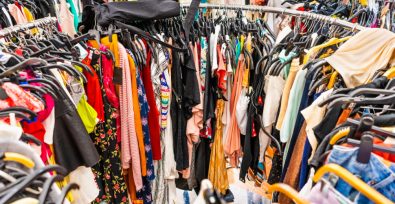Shein has been making efforts recently to go public on the London Stock Exchange. But a recent investigation by the BBC shone a light on the shocking and illegal labor exploitation going on in “Shein Village”, the warren of factories that represent the engine of the world’s largest fast fashion retailer.
“If there are 31 days in a month, I will work 31 days.”
Workers come to Guangzhou from rural locations all over China in search of a higher income. The area has become an industrial hub and the neighborhood known as “Shein Village” is a big part of that. However, the reality of achieving that “higher income” is built on exploitative conditions.
The BBC found that the main workforce, those who labor behind sewing machines, were working for around 75 hours a week. A horrific number of hours and illegal under Chinese labor laws but seemingly ubiquitous in Shein Village.
One 49-year-old woman from Jiangxi who was unwilling to give her name said:
“We usually work, 10, 11 or 12 hours a day, on Sundays we work around three hours less.”
Another worker said:
“If there are 31 days in a month, I will work 31 days.”
Most of those interviewed said at most they only have one day off a month. Workers get paid by the piece. For something simple, like a t-shirt, they get less than $1 USD. So, it’s all about speed and volume. Workers interviewed said the cost of living was so high and they earned so little, that extreme hours were the only way to get ahead.
Polishing up a tarnished reputation
According to Chinese labor law the average working week should not exceed 44 hours. Additionally, employers are supposed to ensure all workers have at least one rest day a week. However, excessive overtime and the lack of a “living wage” seems to be the standard.
David Hachfield from the Asia Floor Wage Alliance stated:
“These (excessive) hours are not unusual, but it’s clear that it’s illegal and it violates basic human rights. It’s an extreme form of exploitation and this needs to be visible.”
Sheng Lu, a professor in Fashion and Apparel Studies at the University of Delaware feels that in order for Shein to achieve their desired IPO they will need to keep the confidence of investors. That means cleaning up their tarnished labor reputation, scrubbing links to Uyghur forced labor and making their supply chain more transparent.
Prof Sheng says:
“Unless you fully release your factory list, unless you make your supply chain more transparent to the public, then I think it’s going to be very challenging for Shein.”
Freedom United stands beside organizations and rights groups demanding Shein be denied them becoming an IPO until they are more transparent about their supply chain. Join us in calling on Shein to stop obfuscating! If Shein wants to go public they must conduct due diligence and clean up their supply chain. We need to send a clear message that forced labor has no place in fashion or on the London stock exchange.
Join us in urging Shein to take meaningful action and send a clear message to the industry: forced labor has no place in fashion.








Freedom United is interested in hearing from our community and welcomes relevant, informed comments, advice, and insights that advance the conversation around our campaigns and advocacy. We value inclusivity and respect within our community. To be approved, your comments should be civil.